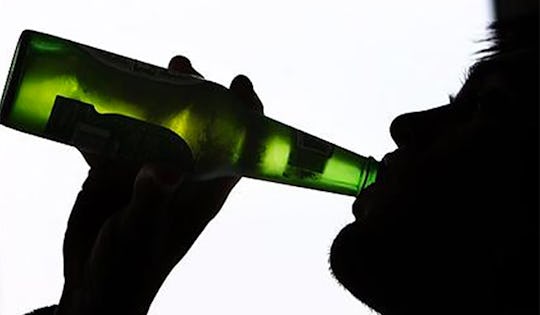Alcohol and Muscle Growth
You may have wondered how detrimental your drinking habits really are on your muscle-building progress. Is it really that harmful to go out with the guys and have a few beers after work on a Friday? If you’re trying to get lean, does this mean you should forego all alcohol for the next month or two?
Or, if you are really diligent with the rest of your diet, can you indulge on the weekend with a few cold ones? Many guys would rather have a few drinks on the weekend than cheat with food that’s not a part of their diet plan. While some struggle to cut out foods, for others, cutting out drinking is the real challenge.
So, what’s the answer to the correlation between alcohol and muscles? How does alcohol affect the muscle-building process? By understanding what happens when you drink, you can make your own judgment calls as to whether or not alcohol should be included in your workout and muscle-building plan. Here’s what you need to know about alcohol and muscles.
Alcohol And Growth Hormones
One major issue with the consumption of alcohol has to do with its effects on the release of growth hormone. Growth hormone is the substance in the body that plays a very large role when it comes to building muscle, stimulating other cell growth and development and promoting optimal bone growth. When this hormone is low, you aren’t going to get the same amount of muscle development as you would when it’s at an optimal level.
Growth hormone is predominately secreted during the early sleeping hours of the night and because alcohol tends to disrupt natural sleep rhythms, it will decrease the amount of growth hormone released. This decrease can be up to as much as 70%, so it will really short-circuit the progress you are able to make.
Alcohol And Testosterone
The next factor to consider is alcohol’s effect on testosterone. As you likely know, testosterone is another huge hormone associated with muscle growth and is the reason why men carry a great deal more muscle mass than women (since men have more testosterone flowing through their bodies).
When you consume alcohol, however, a substance is produced in the liver that is toxic to the release of testosterone. This substance decreases the concentration of testosterone in the body, resulting in lower muscle mass and definition. So, when you consider all the hard work you put in at the gym, also consider the effects derived from the combination of alcohol and muscles.
Alcohol And Recovery
Another area that alcohol effects when it comes to muscle-building is your ability to recover. Since alcohol is a toxin to the body, energy is going to have to be expended in order to remove it from the system and to recover from any negative effects it has had on the tissues.
Since this takes time and energy reserves, you won’t have as much energy in store to recover from your workouts, therefore, you will not be as fresh when you return for your next gym session.
Alcohol and muscles don’t usually get along, so consume with care…
Alcohol and Dehydration
Dehydration is another issue you have to watch out for if you choose to drink alcohol while trying to build muscle and work out. Since alcohol acts as a diuretic in the body, unless you are sure to replace the extra fluid with water or another nonalcoholic beverage that doesn’t contain caffeine, your natural water balance will be disrupted.
Dehydration has a number of negative effects on the body, from inducing feelings of fatigue to causing low physical performance, making you feel mory hungry (which is especially problematic while dieting), and disrupting the ability of the muscle cells to produce ATP — which is your primary source of muscular energy.
Alcohol and Glycogen Synthesis
Aside from ATP, the next source for muscular work is stored muscle glycogen. Unfortunately, though, when you consume alcoholic beverages, alcohol synthesis will take precedence over glycogen synthesis, resulting in decreased stores in the muscle cells.
When you go to do your next workout, your body will have less energy to run on, causing fatigue to set in early.
When your workouts end prematurely, you don’t derive as many benefits in terms of increases in strength since the necessary overloading stimulus (which is partly defined through volume of weights lifted) will not be increased.
Alcohol and Aerobic Ability
If you aren’t as concerned with your strength levels and figure this means alcohol is a safe bet for you, you may want to think again. Even when it comes to aerobic activities, alcohol effects performance.
In this scenario, alcohol can cause an increase in blood pressure throughout the body and a corresponding increase in heart rate.
Since your heart will already be working at an increased rate during aerobic activities, the additional stress from the alcohol will only amplify the heart rate and make the exercise feel harder than it should.
Alcohol and Body Fat
Finally, the last issue surrounding alcohol consumption is that it contains calories, and these do add up quickly. Typically, you’ll likely find yourself drinking beer, wine or hard liquors, which do contain fewer calories than the fancier, sweeter-tasting cocktails that women often drink, so at least that’s an advantage.
Still, at seven calories per gram, after three or four drinks, these calories would equal a good-sized meal. Unless you are going to cut down on food intake in order to make room for these calories (which is rare, as usually you’ll actually find yourself snacking on high-calorie items such as nuts, pizza, wings or nachos), fat gain will result.
Booze Builds Bellies
So, next time you’re contemplating whether or not you should have that drink, keep these factors in mind. Definitely, alcohol and muscle-building are not a good pair, as stated by all these points, but if you aren’t training for any major athletic event or getting ready to step on stage for a bodybuilding competition, chances are that you can afford yourself one or two drinks once in a while without having to worry too much.
Just keep moderation in mind and try your best to consume extra water with the alcohol, eat more vegetables during the rest of the day (to increase nutrient content in your diet while decreasing calories) and allow for a little extra sleep time if you can after you’ve had a few drinks.
Read more: https://www.askmen.com/sports/bodybuilding_200/218b_fitness_tip.html#ixzz2ZWwCb87w

)





